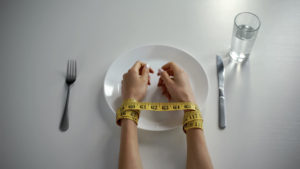Everyone has a relationship with food. Eating food is what fuels us and comforts us. Food is a necessity to live and thrive, but you may find your relationship with food shifting into one that brings you stress and discomfort.
What is Disordered Eating?
We live in a society inundated with ever-changing diet fads that all promise to be the “fix-all” way to eat. Each day, we see photoshopped images and videos that present an unrealistic standard of a “perfect” body that is impossible to achieve. It is no wonder we struggle with having a positive relationship with food or with ourselves. Disordered eating can stem from experiencing difficult life events or trauma. To cope with this traumatic event or painful season of life, you search for something to bring you comfort and a sense of control; food and your physical self can seem like a safe choice. This way of coping can easily manifest into disordered eating such as restrictive eating, compulsive eating, or irregular eating patterns. In the moment, it feels safe and secure, but over time, it can create long-term negative psychological and physical effects. If this resonates with you or someone you love, know you are not alone.
Disordered eating can lead to discomfort and create a sense of guilt and shame. Eating disorders can be difficult to spot, but it is so important to know when to seek help. An eating disorder can be described as a psychological illness with physical side effects. If not treated, eating disorders can become dangerous, and even life-threatening, as they have one of the highest mortality rates of any mental illness.
Below are common signs and symptoms that may point to disordered eating. You may not experience each or all the symptoms, but if you recognize the signs below in your own eating patterns or with a loved one, it is important to reach out for help.
Warning Signs of Eating Disorders
Developing Food Rules: Many people struggling with disordered eating have very specific rules, beliefs, and rituals related to meals and food. This may include only eating certain foods and completely excluding others; eating at specific times of day, and/or needing their environment to be a particular way in order to eat.
Changes in Appearance: There are often extreme weight fluctuations when someone is struggling with an eating disorder, but this is also not always the case. There may be no changes in weight or appearance, but it is a sign to look out for. If someone has experienced a dramatic change in physical size, they may try to cover it up by wearing baggy clothing or through self-isolation. Other physical changes may be the loss of hair and brittle nails.
Changes in Exercise: A person may have specific rules when it comes to workouts and fitness. They may frequently talk about working out, and mention upcoming workout plans, goals, etc in an excessive way. If their plan is not followed through or there are changes in their routine, they may become highly distressed and anxious.
Pre-occupation with Food: This can include frequently commenting on food, meals, calories, and upcoming plans involving food. They may also seem occupied with what others are eating. This hyperfocus on food often comes with anxiety and distress around mealtimes or when having to eat around others.
Body Checking Behaviors: Body checking involves assessing certain parts of the body in very specific ways throughout the day. It can seem compulsive in nature. This is to seek reassurance from themselves or others about their physical appearance.
Social Isolation: Eating disorders thrive in secrecy and isolation and someone suffering from an eating disorder may withdraw from their support system. It can feel safer for them to distance themselves from the ones closest to them in order to keep their eating disorder a secret. If in a social setting, they may appear withdrawn and spaced out. They may want to eat in private or want to be alone immediately after eating.
Changes in Mood: There may be an increase in anxiety, depression, or irritability. These differences in temperament may seem incongruent to how the person typically is or usually feels. People struggling with eating disorders typically feel fatigued and have trouble concentrating as well.
It is important to note that not everyone will experience the same or every symptom listed. Eating disorders impact each person differently and can show up in various ways.
If you or someone you love is struggling with an eating disorder, please reach out for help. Taking this step can seem overwhelming and scary. It takes a lot of strength to start therapy and begin recovery from an eating disorder. No matter if you have been in recovery before, or just beginning to recognize these patterns of disordered eating in yourself or someone you love, you are not alone. We are here to walk with you through this journey of healing and recovery – toward the life you deserve.

Hands tied with tapeline on empty plate, girl obsessed with counting calories
